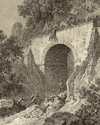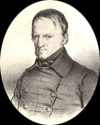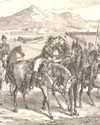19th Century´s militar history in the Basque Country
EUGENIO AVIRANETA. (1792-1872)
 The son of Guipuzcoans, Eugenio de Aviraneta Ibargoyen was born in Madrid in November 1792. Aviraneta spent his childhood in Irun, where he moved to learn French and commerce with his mother's brother. During the War of Independence, he enlisted in the guerrilla forces of Father Merino. He later went on to form part of El Empecinado's partidas (bands), which were closer to his Liberal ideology, as he could not bear the ultra-reactionary Burgos priest. At the end of the war, he went into exile like many other Liberals and began his journey around the world, passing through Mexico, Alexandria, La Habana, New Orleans, Gibraltar and Tangiers.
The son of Guipuzcoans, Eugenio de Aviraneta Ibargoyen was born in Madrid in November 1792. Aviraneta spent his childhood in Irun, where he moved to learn French and commerce with his mother's brother. During the War of Independence, he enlisted in the guerrilla forces of Father Merino. He later went on to form part of El Empecinado's partidas (bands), which were closer to his Liberal ideology, as he could not bear the ultra-reactionary Burgos priest. At the end of the war, he went into exile like many other Liberals and began his journey around the world, passing through Mexico, Alexandria, La Habana, New Orleans, Gibraltar and Tangiers.
 The greatest of his conspiracy plots took place during the First Carlist War. The aim of his spying and intoxication work was to spread mistrust among the diverse sectors of Carlism. To do this, he spread rumours and distributed false documents to create divisions among officials and undermine the morale of the troops. He managed to create a complete archive ("El Simancas") of false documentation in which generals accused each other of treachery and failure. He also hatched a plot to kidnap the pretender Don Carlos, but did not manage to pull it off.
The greatest of his conspiracy plots took place during the First Carlist War. The aim of his spying and intoxication work was to spread mistrust among the diverse sectors of Carlism. To do this, he spread rumours and distributed false documents to create divisions among officials and undermine the morale of the troops. He managed to create a complete archive ("El Simancas") of false documentation in which generals accused each other of treachery and failure. He also hatched a plot to kidnap the pretender Don Carlos, but did not manage to pull it off.
 Although it is difficult to gauge the influence of Aviraneta's conspiracies, there is no doubt that he managed to create divisions among the Carlists, which culminated in the Bergara Convention. Aviraneta published a series of leaflets maintaining that he played a fundamental role in the failure of the Carlists, though his activities were never officially acknowledged.
Although it is difficult to gauge the influence of Aviraneta's conspiracies, there is no doubt that he managed to create divisions among the Carlists, which culminated in the Bergara Convention. Aviraneta published a series of leaflets maintaining that he played a fundamental role in the failure of the Carlists, though his activities were never officially acknowledged.
In subsequent years, he was imprisoned, deported and exiled as the Spanish political scene changed. He was appointed quartermaster-general in 1851, but was imprisoned again during the Progressive Biennium. He died in Madrid in February 1872.
Given the secret nature of Eugenio Aviraneta's chief activities, his biography lies midway between historical fact and fiction. Pío Baroja wrote a series of 22 novels recounting the adventures of this character, under the title Memorias de un hombre de acción (Memoires of a man of action).

